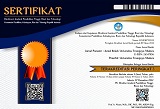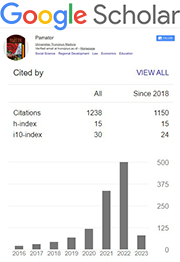Unlocking Work Engagement: How Leadership and Total Rewards Impact Employee Work Engagement Through the Mediating Role of Service Climate in Supply Chain and Logistic Company in Indonesia
Abstract
Keywords
Full Text:
PDFReferences
Albrecht, Simon L., Sarah Furlong, and Michael P. Leiter, ‘The Psychological Conditions For Employee Engagement In Organizational Change: Test Of A Change Engagement Model’, Frontiers in Psychology, 14 (2023), 18
Arnold, Kara A., Nick Turner, Julian Barling, E. Kevin Kelloway, and Margaret C. McKee, ‘Transformational Leadership and Psychological Well-Being: The Mediating Role of Meaningful Work’, Journal of Occupational Health Psychology, 12.3 (2007), 193–203
Bakker, Arnold B., ‘An Evidence-Based Model Of Work Engagement’, Current Directions in Psychological Science, 20.4 (2011), 265–69
Bakker, Arnold B., Simon L. Albrecht, and Michael P. Leiter, ‘Work Engagement: Further Reflections On The State Of Play’, European Journal of Work and Organizational Psychology, 20.1 (2011), 74–88
Bakker, Arnold B., and Evangelia Demerouti, ‘Demands–Resources Theory: Taking Stock And Looking Forward’, Journal of Occupational Health Psychology, 22.3 (2017), 273–85
———, ‘The Job Demands‐Resources Model: State Of The Art’, Journal of Managerial Psychology, 22.3 (2007), 309–28
Chen, Lu, Fan Luo, Xiaomei Zhu, Xinjian Huang, and Yanhong Liu, ‘Inclusive Leadership Promotes Challenge-Oriented Organizational Citizenship Behavior Through the Mediation of Work Engagement and Moderation of Organizational Innovative Atmosphere’, Frontiers in Psychology, 11 (2020), 560594
Crawford, Eean R., Jeffery A. LePine, and Bruce Louis Rich, ‘Linking Job Demands And Resources To Employee Engagement And Burnout: A Theoretical Extension And Meta-Analytic Test’, Journal of Applied Psychology, 5.5 (2010), 834–48
Gruman, Jamie A., and Alan M. Saks, ‘Employee And Collective Voice Engagement: Being Psychologically Present When Speaking Up At Work’, in Handbook of Research on Employee Voice, ed. by Adrian Wilkinson, Jimmy Donaghey, Tony Dundon, and Richard B. Freeman, 2nd edn (Edward Elgar Publishing Ltd., 2020), pp. 397–417
Hair, J. F., G. T. M. Hult, C. M. Ringle, and M. Sarstedt, A Primer on Partial Least Squares Structural Equation Modeling (PLS-SEM), 2nd edn (Sage Publications, 2017)
Hallberg, Ulrika E., and Wilmar B. Schaufeli, ‘“Same Same” But Different? Can Work Engagement Be Discriminated From Job Involvement And Organizational Commitment?’, European Psychologist, 11.2 (2006), 119–27
Karatepe, Osman M., and Hasan Kilic, ‘Relationships Of Supervisor Support And Conflicts In The Work–Family Interface With The Selected Job Outcomes Of Frontline Employees’, Tourism Management, 28.1 (2007), 238–52
Kim, Hyosu, and Dennis Kao, ‘A Meta-Analysis Of Turnover Intention Predictors Among Us Child Welfare Workers’, Children and Youth Services Review, 47 (2014), 214–23
Kim, W. G., H. G. Lee, and Y. S. Yoon, ‘The Impact Of Empowering Leadership On Service Quality And Customer Satisfaction: Examining The Contingency Factors’, Journal of Hospitality & Tourism Research, 40.1 (2016), 31–53
Kim, Woo Gon, and Robert A. Brymer, ‘The Effects Of Ethical Leadership On Manager Job Satisfaction, Commitment, Behavioral Outcomes, And Firm Performance’, International Journal of Hospitality Management, 30.4 (2011), 1020–26
Kular, Sandeep, Mark Gatenby, Chris Rees, Emma Soane, and Katie Truss, Employee Engagement: A Literature Review, 2008
Kwon, K., W. G. Kim, and Y. Kim, ‘The Impact Of Transformational Leadership And Total Rewards On Employee Work Engagement: The Mediating Role Of Service Climate’, Journal of Hospitality and Tourism Management, 42 (2020), 74–85
Luthans, Fred, Bruce J. Avolio, James B. Avey, and Steven M. Norman, ‘Positive Psychological Capital: Measurement And Relationship With Performance And Satisfaction’, Personnel Psychology, 60.3 (2007), 541–572
Neuber, Lina, Colinda Englitz, Niklas Schulte, Boris Forthmann, and Heinz Holling, ‘How Work Engagement Relates To Performance And Absenteeism: A Meta-Analysis’, European Journal of Work and Organizational Psychology, 31.2 (2022), 292–315
Nielsen, Karina, Joanna Yarker, Sten Olof Brenner, Raymond Randall, and Vilhelm Borg, ‘The Importance Of Transformational Leadership Style For The Well‐Being Of Employees Working With Older People’, Journal of Advanced Nursing, 63.5 (2008), 465–75
Oliveira, Lucia Barbosa, and Juliana da Costa Rocha, ‘Work Engagement: Individual And Situational Antecedents And Its Relationship With Turnover Intention’, Review of Business Management, 19.65 (2017), 415–31
Parent-Lamarche, Annick, ‘Teleworking, Work Engagement, and Intention to Quit during the COVID-19 Pandemic: Same Storm, Different Boats?’, International Journal of Environmental Research and Public Health, 19.3 (2022), 1267
Petrou, Paraskevas, Evangelia Demerouti, and Wilmar B. Schaufeli, ‘Crafting the Change: The Role of Employee Job Crafting Behaviors for Successful Organizational Change’, Journal of Management, 44.5 (2018), 1766–92
Posner, Barry Z., and James M. Kouzes, ‘Development and Validation of the Leadership Practices Inventory’, Educational and Psychological Measurement, 48.2 (1988), 483–96
Ringl, Christian M, Sven Wende, and Jan-Michael Becker, SmartPLS 3 (Boenningstedt: SmartPLS GmbH, 2015)
Schaufeli, Wilmar B., Arnold B. Bakker, and Willem van Rhenen, ‘How Changes In Job Demands And Resources Predict Burnout, Work Engagement, And Sickness Absenteeism’, Journal of Organizational Behavior, 30.7 (2009), 893–917
Schaufeli, Wilmar B., Arnold B. Bakker, and Marisa Salanova, ‘The Measurement Of Work Engagement With A Short Questionnaire: A Cross-National Study’, Educational and Psychological Measurement, 66.4 (2006), 701–716
Schneider, Benjamin, Mark G. Ehrhart, and William H. MacEy, ‘Organizational Climate And Culture’, Annual Review of Psychology, 64 (2013), 361–88
Schneider, Benjamin, Susan S. White, and Michelle C. Paul, ‘Linking Service Climate And Customer Perceptions Of Service Quality: Tests Of A Causal Model’, Journal of Applied Psychology, 83.2 (1998), 150–63
Shuck, Brad, and Thomas G. Reio, ‘Employee Engagement And Well-Being: A Moderation Model And Implications For Practice’, Journal of Leadership and Organizational Studies, 21.1 (2014), 43–58
Tang, Z., and E. E. Ibrahim, ‘The Effects Of Total Rewards On Employee Attitudes Towards Customer Service: The Mediating Role Of Customer Orientation’, Journal of Retailing and Consumer Services, 47 (2019), 270–79
Vinzi, V. E, W.W Chin, J Henseler, and H Wang, Handbook Of Partial Least Squares, 1st edn (Berlin: Springer, 2010)
Wang, X., B. Li, and X. Li, ‘The Influence Of Total Rewards On Work Engagement: The Mediating Role Of Service Climate’, International Journal of Contemporary Hospitality Management, 31.4 (2019), 1724–44
World Bank, ‘Indonesia Logistics Sector Assessment’, Worldbank.Org, 2018
Xanthopoulou, Despoina, Arnold B. Bakker, Evangelia Demerouti, and Wilmar B. Schaufeli, ‘Reciprocal Relationships Between Job Resources, Personal Resources, And Work Engagement’, Journal of Vocational Behavior, 74.3 (2009), 235–244
Yao, Jin, Xiangbin Qiu, Liping Yang, Xiaoxia Han, and Yiying Li, ‘The Relationship Between Work Engagement and Job Performance: Psychological Capital as a Moderating Factor’, Frontiers in Psychology, 13 (2022), 192
DOI: https://doi.org/10.21107/pamator.v16i2.19791
Refbacks
- There are currently no refbacks.
Copyright (c) 2023 Indra Fahrizal, Budi Santoso, Aris Budiono

This work is licensed under a Creative Commons Attribution-ShareAlike 4.0 International License.
Jurnal Pamator : Jurnal Ilmiah Universitas Trunojoyo by Universitas Trunojoyo Madura is licensed under a Creative Commons Attribution-ShareAlike 4.0 International License.















.png)